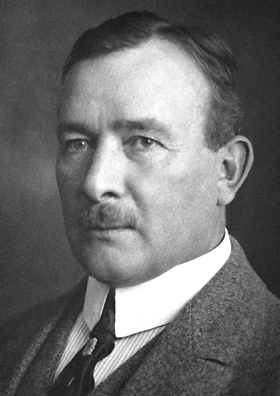
Erik Axel Karlfeldt (July 20, 1864 – April 8, 1931) was a Swedish poet whose highly symbolist poetry masquerading as regionalism was popular and won him the 1931 Nobel Prize in Literature posthumously after he had been nominated by Nathan Söderblom, member of the Swedish Academy. Karlfeldt had been offered the award already in 1919 but refused to accept it, because of his position as permanent secretary to the Swedish Academy (1913–1931), which awards the prize.
Karlfeldt was born into a farmer’s family in Karlbo, in the province of Dalarna. Initially, his name was Erik Axel Eriksson, but he assumed his new name in 1889, wanting to distance himself from his father, who had suffered the disgrace of a criminal conviction. He studied at Uppsala University, simultaneously supporting himself by teaching school in several places, including Djursholms samskola in the Stockholm suburb of Djursholm and at a school for adults. After completing his studies, he held a position at the Royal Library of Sweden, in Stockholm, for five years.
In 1904, Karlfeldt was elected a member of the Swedish Academy and held chair number 11. In 1905, he was elected a member of the Nobel Institute of the academy, and, in 1907, of the Nobel Committee. In 1912, he was elected permanent secretary of the academy, a position he held until his death.
Uppsala University, Karlfeldt’s alma mater, awarded him the title of Doctor honoris causae in 1917.
Karlfeldt’s strong ties to the peasant culture of his rural homeland remained a dominant influence on him all his life. The peasants whom he portrayed are, as one critic put it, “in harmony with nature and the seasons”; their culture is sometimes threatened by the erotic, anarchic Pan. Karlfeldt published his most important works in six volumes of verse: Vildmarks- och kärleksvisor (1895; “Songs of Wilderness and of Love”), Fridolins visor (1898; “Fridolin’s Songs”), Fridolins lustgård (1901; “Fridolin’s Pleasure Garden”), Flora och Pomona (1906; “Flora and Pomona”), Flora och Bellona (1918; “Flora and Bellona”), and finally, four years before his death, Hösthorn (1927; “The Horn of Autumn”). Some of his poems have been published in English translation in Arcadia Borealis: Selected Poems of Erik Axel Karlfeldt (1938). He was a beloved Neoromantic poet whose occasional artistic complexity was emotional rather than intellectual. In time, even some of his admirers criticized him for employing his gifts so exclusively in the service of a dying local culture.
Works in English
- Modern Swedish Poetry Part 1 (1929) – (trans. by C. D. Locock)
- Arcadia Borealis (1938) – (trans. by Charles Wharton Stork)
- The North! To the North! (2001) – (trans. by Judith Moffett, five poets including Karlfeldt)

